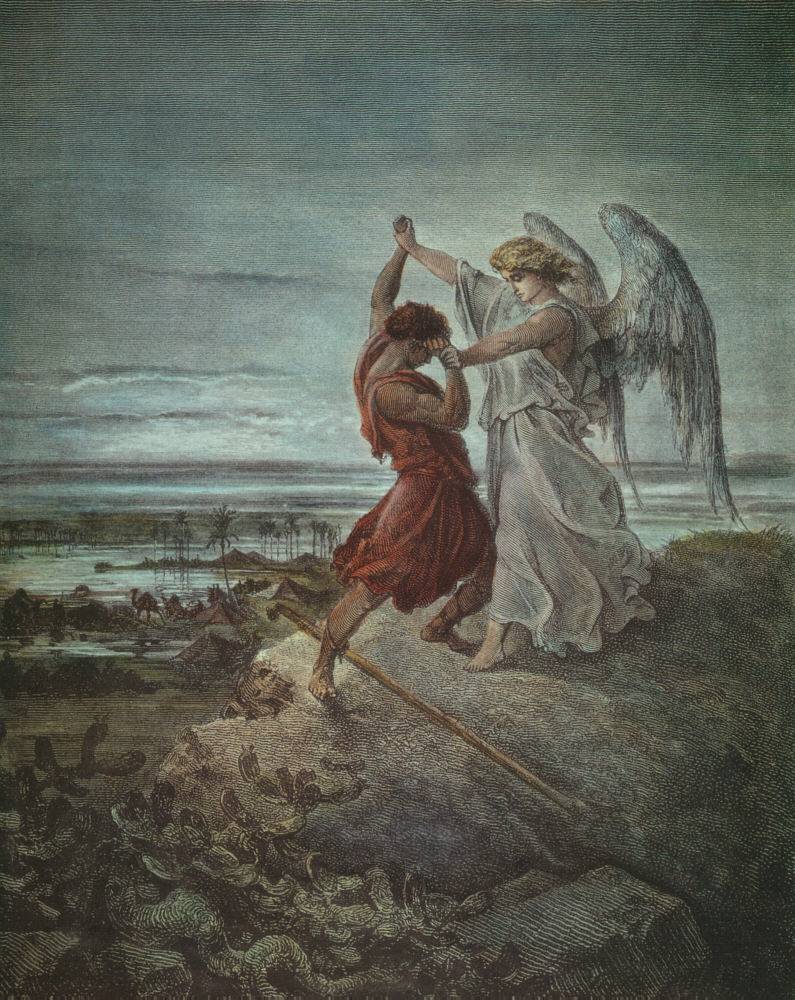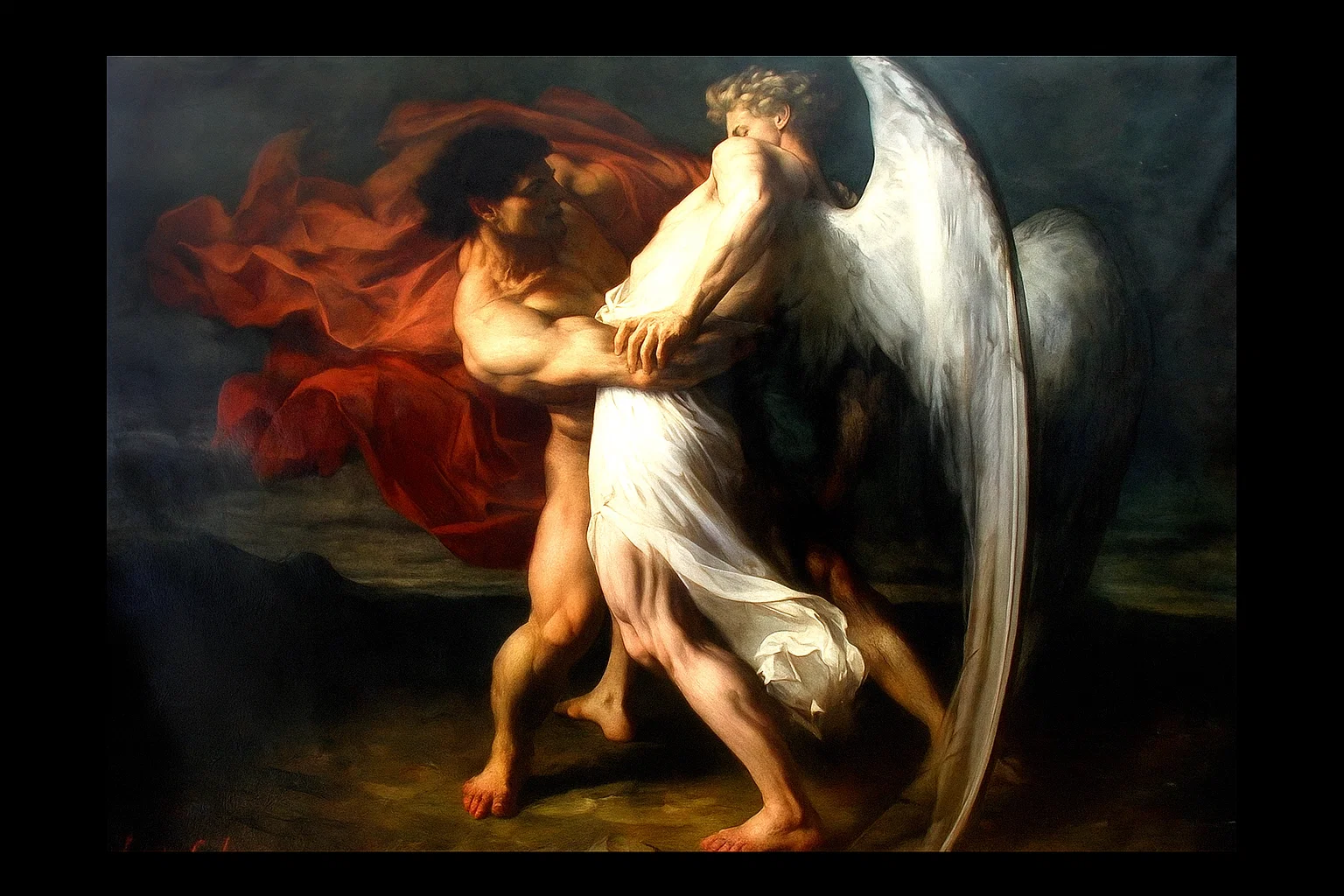The ninth house, known as domus Dei, is the temple of ascent. It traditionally belongs to the mutable fire of Sagittarius, a masculine, diurnal sign that burns through knowledge and expands through faith. It is a cadent house, leaning away from the zenith but joined to the Ascendant by a trine, and so carries the light of the self toward the Divine. It is where the human Spirit seeks the invisible Source, where the mind rises through faith, philosophy, and revelation.
The ancients called it the house of God because its gates open toward the infinite. When we dwell there, we live between heaven and earth. Those with Mars in this house turn faith into conflict. Belief, in this case, must be seized. The pilgrim enters the temple as a fighter. The path toward the Divine is sharp, where the ideas encountered wound the heart. It is the posture of Jacob before the Angel, the one who wrestles with the unseen until dawn breaks.
I. The Combat of Faith
If found in the ninth house, Mars wields a sword made of thought. His weapon is will and his field is theology. He moves through the air of philosophy, cutting through idols and doctrines, seeking the naked face of truth. To believe under Mars is to refuse passivity; it is to engage heaven with the same force once used in worldly battles. The ninth, if Mars falls here, is where theology becomes combat between the finite and the infinite within the soul. The warrior prays to be confronted rather than comforted.
The story of Jacob at the river Jabbok speaks the same language. He meets the Divine through struggle. The Angel wounds his hip but blesses him nonetheless. The limp becomes the mark of election. The moment of fight is also the moment of naming, since the Angel says: “Your name shall be Israel, for you have striven with God and with men, and have prevailed.” (Genesis 32:28). The Latin fathers called this certamen fidei, the contest of faith. Those born with Mars in the house of God carry this same mark. They are driven to confront the Divine, never to deny it.

Such faith ripens through rebellion and thought. It rises from the ruins of certitude, rebuilt in fire. Many prophets, heretics, and reformers bore this seal; their theology smelled of smoke and iron. They tore veils so that the wind of the Spirit could pass. Mars in the ninth demands to touch revelation through ordeal. Once convinced, he defends it with the ardour of one who has faced the infinite and survived.
II. The Name Containing a Woman
The name Yisra’el (יִשְׂרָאֵל) hides a feminine root. The Hebrew verb śārāh (שָׂרָה) means to rule, to prevail, to strive. From this root comes Sarah (שָׂרָה), wife of Abraham, whose name means princess or the one who holds authority. Within Yisra’el lives Sarah and, therefore, within the warrior lives the womb. When the angel says to Jacob that he has prevailed, the word used is śārîtā (שָׂרִיתָ), you have striven; it shares the same root ś-r-h. The change from Jacob to Israel is not only the making of a hero but the union of masculine striving and feminine sovereignty.
Yisra + El (יִשְׂרָה + אֵל) reads as one who contends with God. Sarah + El (שָׂרָה + אֵל) reads as princess of God. Both readings are true. The sages rejoiced in this double sense, since it reveals that Divine combat and Divine union are one act. The wound of Jacob becomes the bridal chamber where two natures meet. The masculine wrestles until it learns to receive. The feminine governs through conception and not through force. Yisra’el carries both Mars and Venus, the spear and the womb reconciled.
When Sarah conceives Isaac (יִצְחָק, Yiṣḥaq), she laughs, and yiṣḥaq means he will laugh. Her laughter echoes Jacob’s struggle. Both moments are impossible: the barren woman giving life; the wounded man walking with God. In both, the impossible becomes seed. The root ś-r-h moves from the tent of Abraham to the river of Jacob, joining the two covenants through one mystery; the Divine is born through endurance.
When we say that Yisra’el contains Sarah, we affirm that no soul contends with heaven alone. Within the masculine contest burns the feminine consent. Within the wound rests the power to conceive. The one who prevails carries the womb of faith within the scar of doubt.
III. The Reconciliation of the Two Powers
In the celestial temple, Mars and Venus are ancient opposites. He divides and she unites. But, in the mystery of Israel, they meet, and their union becomes the seal of maturity. Jacob, renamed Israel, stands in that balance. He ceases to deceive or to flee. He becomes the bridge between justice and love, the human image of Divine proportion.
Martial faith without Venusian heart turns cruel. Venusian devotion without Martial will dissolves into illusion. Israel stands between them. He fights and he loves. He commands and he obeys. The wound on his hip is the mark of his balance, reminding that domination without humility cripples, whilst humility without strength collapses.
This is also the key to the ninth house. The house of God does not demand blind submission, it rather asks for dialogue with eternity. The mind becomes altar and the word becomes sacrifice. Mars purifies belief from superstition; Venus softens the flame with compassion. Together they form the inner priesthood of the soul.
Κύριε ελέησον
